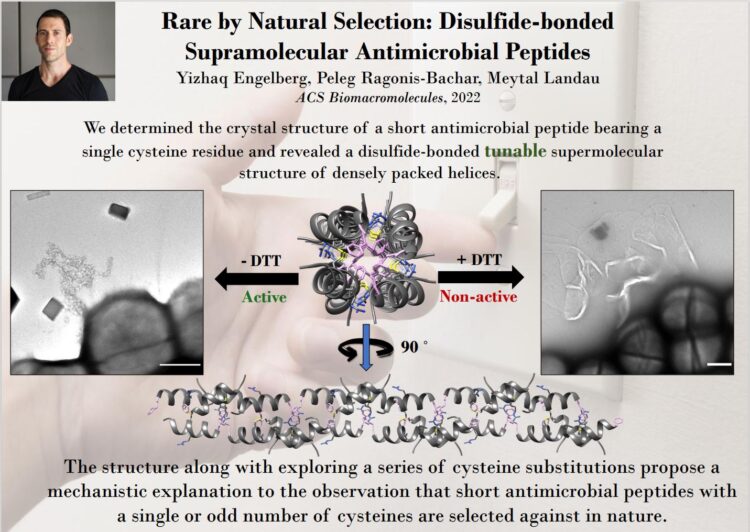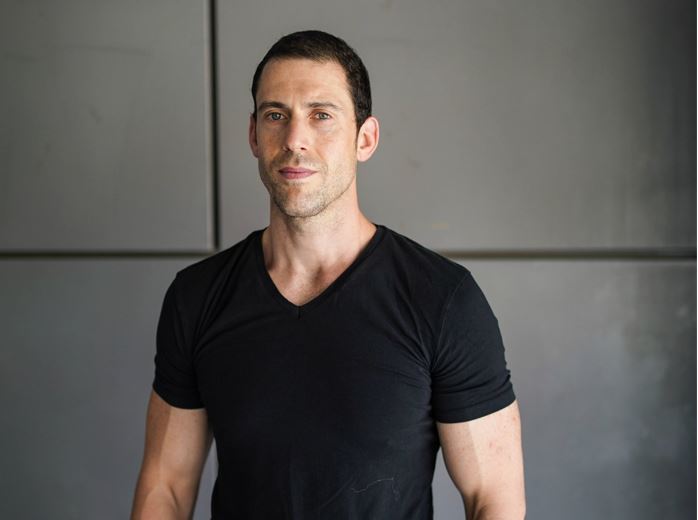SPOTLIGHT ON RESEARCH
PAPER OF THE MONTH JANUARY 22
The Committee for Graduate Studies in the Faculty of Biology selects each month the leading scientific article from all the scientific articles published for that month.
We are pleased to announce that the winner of this November’s article is the doctoral student Yizhaq Engelberg from Prof. Meytal Landau lab, whose article was published in ACS Biomacromolecules
On the occasion of the win, we asked Yizhaq to provide us with some interesting details about the study, the path that led to the research it and also a bit about him.
- Hi, could you introduce yourself in a few words?
Yizhaq (Itzik) Engelberg, 36YO, live in Haifa, married and a father to two kids and a dog. I’ve completed my undergraduate studies a decade ago, went out to work, and came back to a direct track Ph.D. at Prof. Landau’s lab.
- Could you explain what Prof. Landau’s laboratory is about?
Prof. Landau’s research group is a multi-disciplinary lab, that involves research fields of biochemistry, structural biology, material sciences, etc. The group studies the function and the structure of proteins secreted by the innate immune system: a system that defends most organisms on this planet, from plants to microbes and in humans as well. Surprisingly, multiple features and properties of the innate immune system are common to many organisms. For example, the ability to form highly ordered structures. We try to understand why these proteins arrange into defined structures, how does this process affect their functions, and what principles affect them. Understanding the correlation between the structure to the function of these proteins can greatly promote the understanding of many diseases and pathologies, the development of smart materials, and the engineering of novel compounds to fight aggressive infections.
- Could you tell us about your current article/research, what was the main purpose of the research and what did you discover?

In this work, we seek to understand a statistical deviation regarding the frequency of appearance of amino acid, cysteine, in antimicrobial proteins in nature. Antimicrobial proteins are very abundant in nature and are very important to the functionality of the immune system in many creatures, including in humans. We found that this amino acid tends to be found only in pair numbers in these proteins but not in odd numbers. We were able to explain this phenomenon by determining the atomic structure of a highly ordered structure of a protein which we deliberately inserted single cysteine. Using electron microscopy, state-of-the-art biophysical experiments, and more, we found that the presence of an odd number of this amino acid “forces” the proteins to stick to each other and to assemble. This assembly is not energetically stable and also enables pathogens to “turn off” their activity and weakens the immune system. Therefore, we determined that nature had probably dis-select such compounds and as years passed, antimicrobial proteins with odd numbers of cysteine residues we probably extinct.
- Can you elaborate on the importance of the discovery? Why will this discovery serve you and what directions does it take? What is the application of the discovery (domains, solutions)?
The importance of this work stands in understanding phenomena of the evolution of functional materials in nature, and also in the explanation of mechanisms of action of antimicrobial proteins, which have an important role in the immune system activity and in the ability of the host to defend itself. In addition, this work spreads light and allows us to better design efficient and tunable functional materials. These materials have a high potential to be used in many biotechnological, nanotechnological, and biomedical applications.
- What drew you to the current lab/project?
Prof. Landau’s group is a place that promotes personal growth and professional development. The group and especially Prof. Landau are giving the best practical and spiritual tools for a scientist and for each person to find his own place in the world of science. Everybody speaks about personalized medicine; I think that Prof. Landau is a person of personalized science. Students in her group, together with her with other senior members of the group, are building their own way of working. This I believe, is a winning recipe for all parts of the equation to be happy.
- When you are not “doing” science, what do you do?
My life is pretty wild: after work, I come home, take care of the kids, wash dishes, do laundry handling, do floor washing, cooking, etc.
- When you grow up who do you want to be?
A policeman
- what are your plans for the future of your career?
Postdoctoral studies
A link to the full article: https://pubs.acs.org/doi/abs/10.1021/acs.biomac.1c01353
A link to Landau lab site: https://mlandau.net.technion.ac.il/
To Prof. Meytal Landau page: https://biology.technion.ac.il/en/member/landau/








